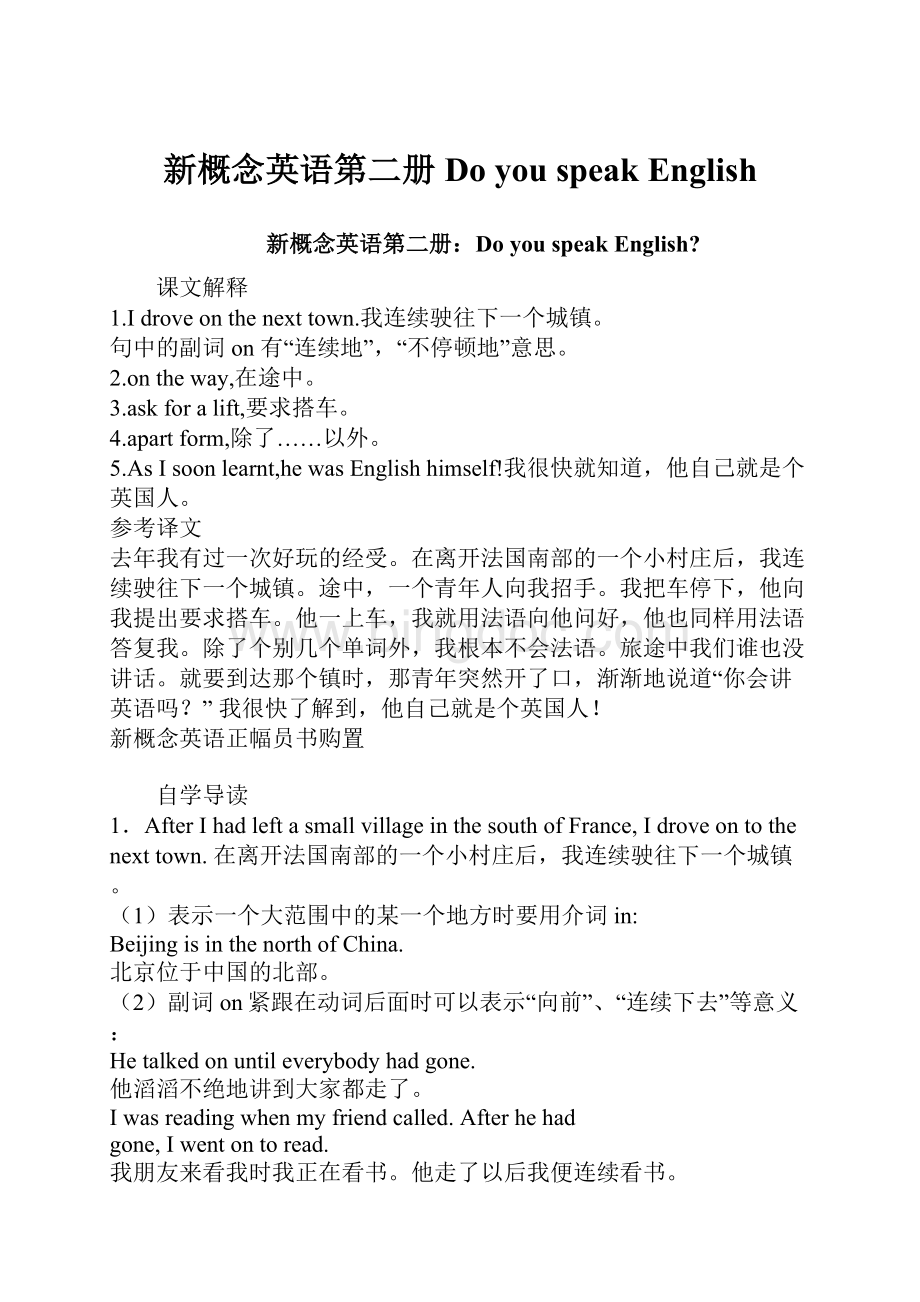新概念英语第二册Do you speak English.docx
《新概念英语第二册Do you speak English.docx》由会员分享,可在线阅读,更多相关《新概念英语第二册Do you speak English.docx(11页珍藏版)》请在冰点文库上搜索。

新概念英语第二册DoyouspeakEnglish
新概念英语第二册:
DoyouspeakEnglish?
课文解释
1.Idroveonthenexttown.我连续驶往下一个城镇。
句中的副词on有“连续地”,“不停顿地”意思。
2.ontheway,在途中。
3.askforalift,要求搭车。
4.apartform,除了……以外。
5.AsIsoonlearnt,hewasEnglishhimself!
我很快就知道,他自己就是个英国人。
参考译文
去年我有过一次好玩的经受。
在离开法国南部的一个小村庄后,我连续驶往下一个城镇。
途中,一个青年人向我招手。
我把车停下,他向我提出要求搭车。
他一上车,我就用法语向他问好,他也同样用法语答复我。
除了个别几个单词外,我根本不会法语。
旅途中我们谁也没讲话。
就要到达那个镇时,那青年突然开了口,渐渐地说道“你会讲英语吗?
”我很快了解到,他自己就是个英国人!
新概念英语正幅员书购置
自学导读
1.AfterIhadleftasmallvillageinthesouthofFrance,Idroveontothenexttown.在离开法国南部的一个小村庄后,我连续驶往下一个城镇。
(1)表示一个大范围中的某一个地方时要用介词in:
BeijingisinthenorthofChina.
北京位于中国的北部。
(2)副词on紧跟在动词后面时可以表示“向前”、“连续下去”等意义:
Hetalkedonuntileverybodyhadgone.
他滔滔不绝地讲到大家都走了。
Iwasreadingwhenmyfriendcalled.Afterhehad
gone,Iwentontoread.
我朋友来看我时我正在看书。
他走了以后我便连续看书。
2.Istoppedandheaskedmeforalift.我把车停下,他向我提出要求搭车。
名词lift的含义之一是“(给步行者)搭便车”、“免费搭车”:
Lastnight,Ihadtowalkhome.Noonewouldgivemealift.
昨晚我不得不走回家。
谁也不情愿让我搭车。
Iwasluckytoday.IgotaliftsoonafterIhadleftthevillage.
我今日运气好,离开村子不久就搭上了便车。
3.Assoonashehadgotintothecar,IsaidgoodmorningtohiminFrenchandherepliedinthesamelanguage.他一上车,我就用法语向他问早上好,他也同样用法语答复我。
(1)表示时间的固定短语assoonas通常表示“一……就……”,即两个动词之间相隔时间特别短:
Tellhimthenewsassoonasyoumeethim.
你一遇见他就把这消息告知他。
(2)表示用某种语言作为交际手段时介词用in,表示讲某种语言时可以不加介词:
speakEnglish/French讲英语/法语
ThatbookiswritteninGerman.
那本书是用德语写的。
HerepliedthequestioninEnglish.
他用英语答复了这个问题。
语法Grammarinuse
过去完成时(Thesimplepastperfecttense)
过去完成时由had+过去分词构成,它表示过去某时或某动作发生之前已经完成的动作或状况,即“较早的过去”。
在用
过去完成时态的句子中,常用的连词有when,after,assoonas,until,bythattime等:
WhenIwokeupinthemorning,shehadalreadyhad
herbreakfast.
当我早上醒来时,她已经吃过早饭了。
Afterhehadsaidgoodbyetousall,CaptainAlisonstartedhisjourney.
当艾利森船长和我们大家都道了别之后,他就启程了。
Didyoureallyringthepolice?
你真的给警方打电话了?
Itwasamistake.IrealizeditassoonasIhadrungthem.
我犯了个错误。
刚给他们打完电话我就意识到了。
Ididn”tknowthatshewasafamousactressuntilyouhadtoldme.
直到你告知我时我才知道她是位名演员。
常与现在完成时连用的副词如already,just,never,never…before也常与过去完成时连用,以强调大事发生的先后次序:
Theboyslovedthezoo.Theyhadneverseenwildanimalsbefore.
男孩们喜爱动物园,以前他们从没见过野兽。
在有些用过去完成时的句子中没有明确的时间状语,但通过上下文可以看出动作发生的先后
词汇学习Wordstudy
1.ask与askfor
ask最常用的意思是“问”、“询问”:
Iasked(Mary)aquestion.
我(向玛丽)问了一个问题。
它也可以表达“恳求”、“要求”或“邀请”等意思:
TheyaskedTonytosingasong.
他们请托尼唱支歌。
Theyaskedhertospendtheweekendwiththem.
他们邀请她一起度周末。
askfor表示“要”、“要求”:
Youarealwaysaskingforhelp.
你总是要人帮助。
Iaskedforacupofcoffee,buttheygavemeacupoftea.
我要的是一杯咖啡,但他们却给了我一杯茶。
2.except,exceptfor与apartfrom
3者都表示“除……以外”,有时可以相互代替使用:
Everyonehashelpedinsomewayapartfrom/exceptfor/exceptyou.
每个人都帮了点忙,只有你没有。
Ihavenootherbooksexcept/exceptforthese.
除了这些书以外我再没有其他书了。
但是except不用于句首,exceptfor/apartfrom则可以:
Apartfrom/Exceptforyou,everyonehashelpedinsomeway.
除了你,每个人都帮了点忙。
3.短语whichof,eitherof,neitherof与bothof
这些短语都可用于指两个人或两件事。
(1)当询问在两个或更多的人或事物中偏爱哪一个或选择哪一个时,可用which:
Ilikebothofthesebags.Whichofthetwodoyouprefer?
这两个包我都喜爱。
你喜爱哪一个?
(2)either与neither都是对两个人或物而言(后接单数名词)。
either指oneortheother(不是这个就是那个),either和neither后跟of时则指两个事物中的每一个:
(3)both只指两个人或物。
当它用在名词前时,of可有可无:
Bothbooks/Bothofthebooksareinteresting.
两本书都很好玩。
当both用在代词前面时,其后必需加of:
Bothofus/themleftearly.
我们俩/他们俩都走得很早。
Ilovebothofyou.
我爱你们俩。
练习答案Keytowrittenexercises
1.关键句型练习答案
A1IdroveontothenexttownafterIhadleftasmallvillage.2IsaidgoodmorningtohiminFrenchassoonashehadgotintothecar.
3Ihadnearlyreachedthetown,whentheyoungmansaid:
‘DoyouspeakEnglish?
’
C1Aftershehadwrittentheletter,shewenttothepostoffice.
2Afterhehadhaddinner,hewenttothecinema.
3WhenIhadfastenedmyseatbelt,theplanetookoff.
4Wedidnotdisturbhimuntilhehadfinishedwork.
5Assoonashehadlefttheroom,Iturnedontheradio.
6Hehadbeenveryillbeforehedied.
D1regretted2hadbegun/began3arrived
2.难点练习答案
1Exceptfor2bothof3Apartfrom
4asked…askfor5neitherof…asked
3.多项选择题答案
1b2c3a4c5d6b
7c8b9c10b11b12b
【Newwordsandexpressions】生词和短语
★amusing adj.好笑的,好玩的
amused5:
感到好笑的
amuse4v.
动词后面会加人做宾语
Thestoryamusedme.
Thestoryisamusing.
iamamused.
interesting:
有意思
Thebookisinteresting.
Thebookisamusing.
funny:
好笑的,可以指贬义,快乐的,令人快乐的
interesting/funnystory
★experience n.经受
阅历:
不行数名词
经受:
可数名词
Hehasalotofexperience.
Hehasalotofexperiences.
+s(a/an),经受;原形,阅历
experienced6:
有阅历的
Heisanexperienceddoctor.
★wave v.招手
wavetosb;向某人招手
★lift n.搭便车
be动词+形容词/介词
be动词后面不能是名词,一旦是名词,就认为主语和后面的名词是等号关系
Iamateacher.
Iwasalift.
takeabus/taxi/lift
takealift:
搭便车
Itakealist.
Thestudentgavemealift.
givesbalift:
让某人搭便车
Bwantstotakealift.
AwillgiveBalift.
thumblift:
拇指便车
Iwanttotakealist.
★reply v.答复
answer
Heanswered/replied.
answersth/replytosth.
answertheletter:
回信
Iwillreplytotheletter.
★language n.语言
nativelanguage:
母语
mothertongue
ThenativelanguageisChinese.
MymothertongueisChinese.
★journey n.旅行
beginatrip:
开头一个旅行
beginajourney
trip,travel,tour
trip:
短距离旅行或出差
goonBusiness/goonatrip
travel:
周游(长途)
tour,为了玩
tourist:
游客
journey:
全部的旅行
goonajourney,3days”journey
2hours”journey
voyage:
旅行(海上)
flight:
空中飞行
journey:
偏重于陆地旅行
trip;travel;tour;journey;voyage;flight
课文讲解】
搭便车:
takealift
给某人搭便车:
givesbalift
路程,旅行:
journey
经受:
experience.
一般有意思,interesting、funny, amusing顷向于让某人笑出声
Ihadanamusingexperiencelastyear.
after,从句的标志,后面叫时间主语从句
when,while,as:
当什么时候,until,before,after
简洁句当中一个谓语,有从句有主句,从句一个谓语动词,主句一个谓语动词
after:
在什么什么之后,主句的动作发生在从句之后,从句的动作发生在主句的
前面,从句的动作发生在前,主句的动作发生在后
假如两个都是过去时,同时发生,会用进展时态;假如一先一后,发生在前的动作
为过去完成时(haddone)
after后面的从句一个变成过去时,一个变成过去完成时,肯定是从句用过去完成时。
before:
在什么什么之前,主句发生在从句之前,主句用过去完成时。
地点做介词短语修饰前面的名词
inthesouthof
表达方位的表达方式一共有3个介词,in,on,to
没有相接的,是相离的,to
接壤,on
在什么里面,in
driveto:
开车去某地,driveon(on:
连续),on加在动词的后面表示连续
ontheway:
在路上,在途中
wavetosb:
冲某人挥手
Istopped=Istoppedthecar.
asksbforsth:
恳求某人要求得到什么东西
assoonas:
一...就...户名肯定要加一个句子(时间主语从句),
后面的先发生
AssoonasIhadreceivedtheletter,Iringed/calledhimback.
只要是状语从句,一旦遇到将来时,变为一般现在时
Assoonasyouarrive,youmustcallme.
Assoonas强调两个动作几乎是连在一起的
saygoodbye,saysorry,sayhello,saygoodmorningtohim
用某种语言:
in+某种语言
IspeakEnglish.IsayawordinChinese.
reply要想加宾语要加to
inthesmaelanguage
assoonas:
一...就...
AssoonasIhadenteredtheroom,Itookoffmycoatatonce.
apartfrom:
除了什么之外,except
except,exceptfor,apartfrom
1.whenexceptisusedatthebeginningofasentence,itisfollowedbyfor.
2.apartfrom习惯上喜爱放句首,apartfrom=except=besides
假如认为整体之中做这件事情的人除了整体之外,还有这个人也做了,是加号
假如认为整体之中做这件事情的人除了整体之外,这个人没有做,是减号
Allthepassengersaremillionaire7exceptus.减号
3.except:
从整体之中减掉,besides假如放在句首,统一用apartfrom
4.exceptfor含有对整体中的某一个方面不满足
Thearticleisverygoodexceptforhishandwriing.
exceptfor可以不放在句首,强调整体当中某一方面除外,剩下的整体都不错
Exceptforhisheight,heisveryexcellent.
【Specialdifficulties】
IinvitedeveryoneexceptGeorge.ExceptforGeorgeIinvitedeveryone.
Exceptfor/apartfromthis,everythingisinorder.
Exercise
1.exceptfor
3.apartfrom(Exceptfor)
exceptfor=apartfrom,喜爱放在句首
except和besides可放句子中间,besides指在整体上加上,except要从整体减掉
notatall:
一点点都不
Idon”tlikeit.Idon”tlikeitatall.
apartfrom=except
Apartfrommysister,Ilikeeveryone.
Apartfromafewwords,IknowanyFrench
neither
duringthejourney:
在旅途当中,自始自终
neitherofsb,eitherofsb
eitherofsb:
什么当中的任何一个
neitherofsb:
什么当中的任何一个都不
either,neither都是指两个当中的任何一个
假如不只两个人,就变成noneof
none,neither一旦消失,这句话就不会再有not
Idon”tlikethebook,Mysisterdoesn”tlikeiteither.
Neitherofuslikes it.
nearly:
将要
when:
就在此时
IhadnearlyreachedHomewhenIfoundmymotherstanding8there.
DoyouspeakEnglish?
问的是一个事实 你说英语吗?
你是说英语国家的人吗?
Doyouswim?
你去游泳吗?
Canyouswim?
你会游泳吗?
AsIlearnt.learn:
知道,得知
我得知:
Ilearn; 我知道:
Iknow
Asweknow,theNewConcept9Englishisverygood.
As+主语+动词+逗号+句子,As:
正如
AsIthink,itisthecoldestdayintheyear.
Asmymothersaid/AsIheard
Ashesaid,Englishiseasytolearn.
himself,反身代词单独放在句尾,起强调作用
IreadEnglishmyself.
总结
assoonas+从句,表示时间,一...就...
apartfrom=exceptfor,放在句首,除了什么之外
neitherof:
两者之间都不,一旦消失,这句话里面不会再消失not
三者或三者以上之间都不:
noneof
AsIlearnt,正如......
Assbdosth,肯定要加逗号,再加另外一个句子
英语当中的第一句话往往起着概述的作用
有两种方式可以背诵:
一种是硬背,另一种是先理解,然后根据事情的进展挨次背
【Keystructures】过去完成时
过去完成时:
过去的过去或两个动作都在过去,一个动作在前,一个在后,
发生在前的动作为过去完成时
过去完成时肯定要以一个过去时态在铺垫,这个动作肯定要发生在haddone之后
until:
直到什么时候为止,直到什么时候才
until,在后面一个从句之前发生了主句
until,主句和从句两个都用一般过去时对,主句和从句然后一个用过去完成是也对
Ihadnotunderstoodtheproblemuntilheexplainedit.
4.Wehadn”tdisturbedhimuntilhefinishedwork.
Wedidn”tdisturbhimuntilhehadfinishedwork.
Wedidn”tdisturbhimuntilhefinishedwork.
after后面会家过去完成时,before后面会加一般过去时
ExercisesD
1.Themoment后面直接加从句,Themoment=assoonas
一般过去时,regretted
2.before引导的从句用一般过去时,主句用过去完成时
hadbegun
3.arrived,过去完成是肯定要和过去的过去有关
【Specialdifficulties】
a.askandaskfor
asksth:
问什么什么东西,askaquestion/asksb
askforsth:
要求得到,askfortheanswer
c.whichof,eitherof,neitherof,bothof
eitherof:
两者当中的任何一个
neitherof:
两者都不
whichof:
那一个,whichofthetwo
bothof:
两者都
Whichofthetwodoyoulike?
Iwantbothofthem.Iwanteitherofthem.Iwantneitherofthem.
Exercise
2.bothof
4.asked,askfor
5.eitherof,前面有not
Multiplechoicequestions】
6....b...
French不行数,不能用many
plentyof:
足够多的
notmuch:
alittle
notalittle:
much
7....c....
neither不会和not连用
either:
任何一个
both:
两个都
neitherof,不能说weneither,只能说neitherofus
11...b...
responded和replied用法一样
replied后面加宾语肯定要加to, answer直接加
9....c...
salute10:
军礼,军人的问候
10...b...
tram